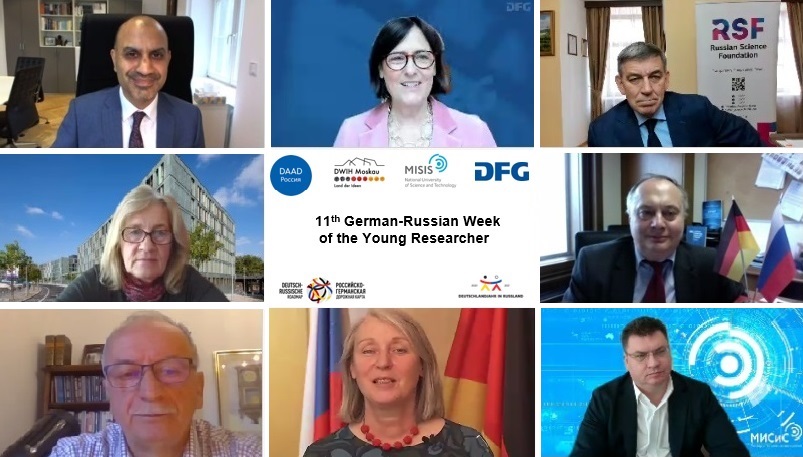11th German-Russian Week of the Young Researcher – “Internationalisation of Science and Research during the Pandemic”
(25.10.21) At the end of October, the DFG and the German Academic Exchange Service (DAAD) hosted the 11th German-Russian Week of the Young Researcher at the German Centre for Research and Innovation (DWIH Moscow). Discussion focussed mainly on current challenges and the importance of cross-border research cooperation during the pandemic. The event was held as a one-day online conference due to the pandemic, like last year: opened by DFG President Professor Katja Becker and DAAD President Joybrato Mukherjee, it included impulse statements and a panel discussion.

Session I of the virtual German-Russian Week of the Young Researcher (from left): J. Mukherjee (DAAD), K. Becker (DFG), A. Khlunov (RSF), G. Hermani (BMBF), V. Kvardakov (RFBR), Yu. Balega (RAS), B. Grzeski (German Embassy Moscow, via video message), S. Salikhov (NUST MISIS)
© DFG
At the opening, participants were welcomed by the directors of the two lead organisations. The speeches by DFG President Professor Katja Becker and DAAD President Joybrato Mukherjee were followed by a video message from Envoy Beate Grzeski of the German Embassy in Moscow, who praised the event as an outstanding contribution to the ongoing Year of Germany in Russia. Afterwards, Head of Division 212 “Cooperation with Eastern Partnership Countries, Russia and Central Asia”, Gabriele Hermani, conveyed official greetings from the Federal Ministry of Education and Research (BMBF), emphasising the importance of the Young Researcher Weeks in implementing the roadmap between Germany and Russia. The Russian representatives were Alexander Khlunov, Director General of the Russian Science Foundation, Yury Balega, Vice President of the Russian Academy of Sciences, Vladimir Kvardakov, Deputy Council President of the Russian Foundation for Basic Research, and Sergei Salikhov, Deputy Council President of this year’s event partner – the National University for Science and Technology MISIS, Moscow.
Like last year, the 11th Week of the Young Researcher was dedicated to bilateral cooperation during the pandemic; in view of the ongoing restrictions, it was once again reduced to being held as a one-day virtual event in two sections. After the welcoming addresses, the first round of talks was devoted to “Challenges for Science and Prospects of Joint Research for Germany and Russia”. Keynote speeches by high-ranking representatives of the DFG, DAAD, RSF, RAS, RFBR and MISIS addressed the impact of the pandemic on research and bilateral cooperation, both now and in the future. The panel carried on from last year’s discussion, describing the measures and strategies adopted by individual research organisations in response to the pandemic, as well as looking at potential forms of cooperation that might arise in the future. In this connection, particular importance was attached to the sound, long-standing relations between Germany and Russia and the numerous joint research projects as a stable foundation that was capable of maintaining collaboration through the pandemic. All speakers agreed that promoting early career researchers was crucial. However, it was said that this would also mean creating suitable framework conditions for exchange, such as new mobility programmes, new forms of publication in the face of increasing digitalisation, and also new networking platforms and communication forums.
The second section featured presentations of ongoing projects in various areas of basic research that are currently being pursued by the organisations that support DWIH Moscow. Early career researchers from the Helmholtz Association (Karlsruhe Institute of Technology), the Leibniz Association (IOER Leipzig), the University of Duisburg-Essen, RWTH Aachen and the University of Regensburg along with their Russian cooperation partners based in Moscow, Saint Petersburg, Krasnoyarsk and other cities reported on their current experiences from both an academic and a personal point of view. There was an obvious desire for face-to-face meetings with academic colleagues, as well as improved mobility options. It became abundantly clear that despite massive restrictions on mobility, new opportunities for exchange were emerging as well – the numerous German-Russian collaborations between universities and research institutions continue, with some even being launched under pandemic conditions.
The fundamental goal of the Week of the Young Researcher format is to create a broad network and intensify cooperation at the level of early career investigators. The conferences address interdisciplinary and forward-looking areas that also take into account current priorities and potential in terms of bilateral cooperation between Germany and Russia. The last two events also mainly served the purpose of enabling person-to-person dialogue and maintaining contacts between the representatives of the participating research organisations and academics, since face-to-face meetings have not been possible for the last two years.
The Week of the Young Researcher was launched in 2011 at the initiative of the DAAD and the DFG as part of the German-Russian Year of Research, Education and Innovation and takes place once a year at different locations in Russia with a varying thematic focus. They are organised in cooperation with the Russian research organisations at the country’s leading universities and research centres (Moscow, St. Petersburg, Kazan, Yekaterinburg, Novosibirsk). This year’s partner university was the National University of Science and Technology MISIS in Moscow, which achieved the status of a “National Research University” in 2008 and as such belongs to the group of leading universities in Russia. Nobel Prize winner Alexei Abrikosov is directly linked to MISIS, having previously held the Chair of Theoretical Physics there. MISIS actively supports the implementation of the German-Russian roadmap by organising and participating in bilateral events, where it acts as an important contact partner on the Russian side.